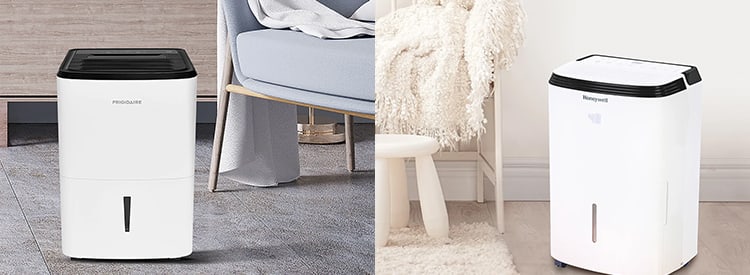One of the most frequent questions we receive is, “Do dehumidifiers add heat to a room?” The short answer is, “Not significantly.”
Understanding Heat Generation in Dehumidifiers
Dehumidifiers produce a small amount of heat as they operate, but it’s usually not enough to make a noticeable difference in your space. Here's why:
- Heat Production Process: As a dehumidifier works, it draws in humid air, cools it to the point where moisture condenses, and then warms the air slightly before circulating it back into the room. This process introduces some warmth, but the effect is minimal.
- Impact on Room Temperature: Most people don’t feel the temperature increase because the dehumidifier’s primary function is to remove moisture from the air. By reducing humidity, the air feels cooler and more comfortable, offsetting any slight increase in temperature.
Comfort Over Heat
The key benefit of a dehumidifier is enhanced comfort. High humidity can make a room feel stuffy and warmer than it is. A dehumidifier removes this excess moisture, creating a more pleasant environment even if the temperature rises slightly.
How Dehumidifiers Operate
Dehumidifiers work in a two-step process:
- Moisture Removal: Humid air is pulled into the unit, cooled to condense the moisture, and collected in a bucket.
- Air Circulation: The now-drier air is reheated slightly through condensation and then circulated back into the room. Additionally, the compressor, which is necessary for dehumidification, generates a small amount of heat.
Factors Influencing Heat Output
- Size of Dehumidifier: Choosing the right size dehumidifier is crucial. A unit that’s too small will run continuously, potentially adding more warmth. Ensure you select a dehumidifier that matches the size of your room for optimal performance.
- Room Size and Humidity Levels: The heat from the dehumidifier may be more noticeable in smaller rooms or areas with severe humidity. Larger spaces or areas with moderate humidity levels will generally experience less of an impact.
- Running Time: Dehumidifiers operate only when the room’s humidity exceeds the set level, so they don’t run continuously like other appliances.
Maintaining a Healthy Environment
Despite the minor heat increase, dehumidifiers improve indoor air quality by reducing moisture. This helps prevent mold and structural damage, resulting in a healthier living environment and greater overall comfort.
Minimizing Heat Concerns
If you’re concerned about heat:
- Ducting Options: Consider models that can be ducted to another room or space. For example, Santa Fe dehumidifiers can be placed in less-used areas like basements and ducted to distribute dry air where needed.
- Whole-House Systems: HVAC-integrated dehumidifiers are a quieter, more efficient option. They work with your existing HVAC system to dehumidify your home without adding noticeable heat. Brands like Aprilaire and Ultra-Aire are popular choices.
Need More Information?
If you have further questions or need assistance choosing the right dehumidifier, our product experts are here to help. Call 1-800-934-9194 or email us at [email protected].


